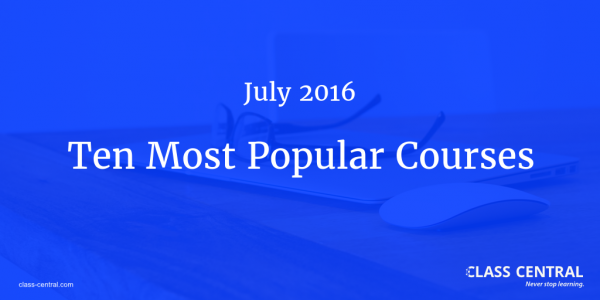
Here’s a quick and easy way to beat the July heat. Dial up the A/C and sign up for one of 250 MOOCs (Massive Open Online Courses) getting started this month. They’re all neatly catalogued by the education web site Class Central, which also tracks the most popular MOOCS offered each month. Find the 10 most popular MOOCs starting in July below.
University of California, Irvine via Coursera
English is a difficult language to learn because of its many obscure grammatical rules, which are fairly easy to mess up–even for native speakers. Learn tips that will help you understand the rules and give you lots of practice with the tricky grammar of everyday English.
Bookmark | Starts 25th July, 2016
2) Japanese Culture Through Rare Books
Keio University via FutureLearn
A book is a tool for preserving words and images. Through books, an abundance of information, including the knowledge and experiences of the people of the past, has been handed down to the present. Explore the important roles that books have played in the cultural history of Japan.
Bookmark | Starts 18th July, 2016
3) Hinduism Through Its Scriptures
Harvard University via edX
Ever wondered about the sacred scriptures that have sustained for millennia one of the oldest and most diverse religions of the world — Hinduism? Want to discover the lessons this history may offer mankind in the 21st century?
Bookmark | Starts 5th July, 2016
4) Organizational Behavior: Managing People
IESE Business School via Coursera
The objective of this course is to provide insight into four key areas in the domain of organizational behavior: Motivation, Leadership, Teamwork, and Organizational culture.
Bookmark | Starts 11th July, 2016
5) Developing Intelligent Apps
Microsoft via edX
In this data science course for developers, you will learn how to create smart applications that use the power of machine learning to engage with users in previously unimaginable ways.
Bookmark | Starts 11th July, 2016
6) Social Media Analytics: Using Data to Understand Public Conversations
Queensland University of Technology via FutureLearn
From the personal to the political, social media conversations are at the heart of cultural and social change. In this course you will be introduced to digital methods to analyze social media data on Twitter.
Bookmark | Starts 18th Jul, 2016
7) Question Everything: Scientific Thinking in Real Life
University of Queensland via edX
Have you ever wondered how you can apply math and science skills to real life? Do you wish you could go beyond what you’ve learned in the classroom? This science course will advance your knowledge as we unpack some important scientific thinking skills using real-world examples.
Bookmark | Starts 12th Jul, 2016
Duke University via Coursera
This course describes Bayesian statistics, in which one’s inferences about parameters or hypotheses are updated as evidence accumulates. You will learn to use Bayes’ rule to transform prior probabilities into posterior probabilities, and be introduced to the underlying theory and perspective of the Bayesian paradigm.
Bookmark | Starts July, 2016
Eindhoven University of Technology via FutureLearn
Process mining is a new and exciting field which combines business process management with data science. Use the free, open source process mining framework (ProM) to analyze, visualize, manage and improve a range of business processes.
Bookmark | Starts 11th July, 2016
University of California, San Diego via Coursera
The world and internet is full of textual information. We search for information using textual queries, we read websites, books, e‑mails. All those are strings from the point of view of computer science. To make sense of all that information and make search efficient, search engines use many string algorithms.
Bookmark | Starts 25th July, 2016


Will the # 3 above, “Hinduism Through It’s Scriptures” be offered again soon?